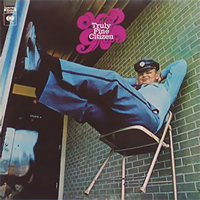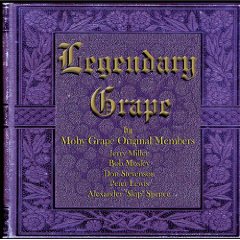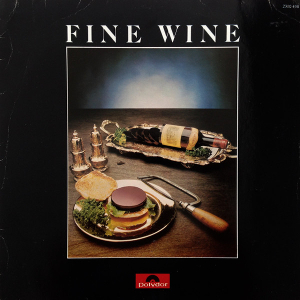
The Grapes of Wrath is an American realist novel written by John Steinbeck and published in 1939. The book won the National Book Award
and Pulitzer Prize for fiction, and it was cited prominently when Steinbeck was awarded the Nobel Prize in 1962.

Moby Grape is an American rock group from the 1960s, known for having all five members contribute to singing and songwriting, which collectively merged elements of folk music, blues, country, and jazz with rock and psychedelic music. They were one of the few groups of which all members were lead vocalists. The group continues to perform occasionally.
The idea of the Great American Novel is the concept of a novel of high literary merit that shows the culture of the United States at a specific time in the country's history. The novel is presumably written by an American author who is knowledgeable about the state, culture, and perspective of the common United States citizen. The author uses the literary work to identify and exhibit the language used by the people of the U.S. during that time and to capture the unique experience of living in the U.S. or one part of the U.S., especially at that time. In historical terms, it is sometimes equated as being the U.S. response to the national epic.

Alexander Lee "Skip" Spence was a Canadian-born American musician and singer-songwriter. He was co-founder of Moby Grape, and played guitar with them until 1969. He released one solo album, 1969's Oar, and then largely withdrew from the music industry. He had started his career as a guitarist in an early line-up of Quicksilver Messenger Service, and was the drummer on Jefferson Airplane's debut album, Jefferson Airplane Takes Off. He has been described on the AllMusic website as "one of psychedelia's brightest lights"; however, his career was plagued by drug addictions coupled with mental health problems, and he has been described by a biographer as a man who "neither died young nor had a chance to find his way out."
Jerry Miller is an American songwriter, guitarist and vocalist. He performs as a solo artist and as a member of the Jerry Miller Band. He is also a founding member of the 1960s San Francisco band Moby Grape, which continues to perform occasionally. Rolling Stone included Jerry at number 68 on their list of the 100 greatest guitarists of all time and Moby Grape's album 'Moby Grape' at number 124 on their list of the 500 greatest albums of all time.

Moby Grape is the 1967 debut album by rock band Moby Grape. Coming from the San Francisco scene, their reputation quickly grew to immense proportions, leading to a bidding war and a contract with Columbia Records. The album peaked at #24 on the Billboard 200 albums chart in September 1967.

Wow/Grape Jam is the second album by the rock band Moby Grape. It was first released in April 1968. It is different from most double album releases in that it was released as two different albums in separate covers, but packaged together and sold for only one dollar more than price of a single LP.

Moby Grape '69 is the third album by the psychedelic rock band Moby Grape.

Truly Fine Citizen is the fourth studio album by American rock band Moby Grape. It was released on July 30, 1969, by Columbia Records. After completing the album, the band went on hiatus until 1971 when they reunited with Skip Spence and Bob Mosley to record the reunion album, 20 Granite Creek.
Peter Lewis is one of the founding members of the band Moby Grape. Three of his better known songs with Moby Grape are "Fall on You" and "Sitting by the Window" from the self-titled first Moby Grape album and "If You Can't Learn from My Mistakes" from Moby Grape '69.
Don Stevenson is the American drummer and a singer and songwriter for Moby Grape, a band which was formed in San Francisco in 1966 and continues to perform occasionally today.

The Place and the Time is a compilation album of demos, outtakes, alternative versions and live versions of songs by Moby Grape, released by Sundazed Records in 2009 in CD and double LP format.
Vintage: The Very Best of Moby Grape is a retrospective collection of Moby Grape songs, many previously unreleased, originally issued in 1993 as part of Columbia Records' "Legacy" series. Included in the collection was the entire eponymous first album of the group, generally considered to be one of the most important albums of its era. Noted rock critic David Fricke wrote the liner notes to the compilation.
Listen My Friends! The Best of Moby Grape is a compilation album by Moby Grape, released in 2007 by Columbia Records as part of its "Legacy" series.

Legendary Grape is an album by Moby Grape, released by Dig Music in 2003.

Fine Wine is an album released in 1976 by Polydor Records in Germany, by a group of the same name. The four-person group included two members of Moby Grape, Jerry Miller and Bob Mosley, who also wrote or co-wrote most of the songs on the album. For these reasons, the album is often regarded as a Moby Grape album.
The Rhythm Dukes was a short-lived band featuring Jerry Miller and Don Stevenson of Moby Grape, subsequently joined by Bill Champlin, of the Sons of Champlin, and later of Chicago.

Moby Grape Live is a 2010 album, released by Sundazed Records, of previously unissued live recordings of the band Moby Grape. Included are recordings of the band in its prime in 1966 and 1967, as well as 1969 recordings, subsequent to the 1968 collapse and departure of founding member Skip Spence. A particularly notable inclusion is the band's performance at the historic Monterey International Pop Festival. According to critic Mark Deming, "While Moby Grape's studio work might offer a clearer picture of the strength of their songs, Historic Live Moby Grape does a brilliant job of revealing what made them great as a band, and the best tracks here should prompt any serious fan of late-'60s rock to reaffirm Moby Grape's status as one of the finest acts of their time." According to another reviewer, "After the essential debut record, this is the Moby Grape record I would recommend next."
Seeing is a concerto for solo piano and orchestra by the American composer Christopher Rouse. The work was commissioned by the New York Philharmonic for the pianist Emanuel Ax, with financial contributions from philanthropists Lillian and Maurice Barbash. It was premiered at Avery Fisher Hall in New York City May 6, 1999, with Leonard Slatkin conducting Emanuel Ax and the New York Philharmonic. The piece is dedicated to Emanuel Ax.











